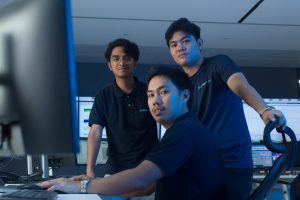 AFTER close to a year of struggling with the COVID-19 pandemic, stress and worries on the uncertainties of the future are magnified.
AFTER close to a year of struggling with the COVID-19 pandemic, stress and worries on the uncertainties of the future are magnified.
Fears of contracting the virus, or affecting the people we care about, as well as confronting new realities of working from home, the blended learning system, isolation, among others, have taken a toll on our mental health.
“Needless to say, we are also facing a mental health crisis – anxiety and fatigue triggered by the COVID-19 pandemic. Making matters worse is that a lot of people do not know that they have it,” said Annabelle L. Reyes, doctor of neurology and psychiatry based in Davao City.
Reyes is the chair of the Department of Neurosciences at Brokenshire Medical School and the chair of the Cluster Ethics Review Board of the Metro Davao Medical and Research Center. She is also the chair of the Department of Health Ethics Review Board at the Southern Philippines Medical Center.
“The World Health Organization reported that 85% of the population will develop COVID-19 anxiety and 60% with COVID-19 fatigue. This pandemic revealed numerous emotional outcomes, including stress, depression, irritability, insomnia, fear, confusion, anger, frustration, boredom, and stigma associated with quarantine. It made us realize that we are not just dealing with the coronavirus alone,” she added.
Having been locked down for a long time, people are getting tired, restless and anxious at the same time. According to Reyes, some people would break down to tears without any reason. Some feel exhausted, while others spend sleepless nights. The ongoing pandemic seems to have generated an effect related to adverse mental or behavioral health conditions, including symptoms of anxiety disorder or depressive disorder, trauma-related symptoms.
And when the condition gets worse, it can exhibit physical manifestation.
“Some develop stomach pain and vomiting, especially to men. Others think it is just gastritis but it is actually the loss of serotonin, the chemical in our brain that makes us feel relaxed. However, the epinephrine (also known as adrenaline) is high, keeping our body on the ‘fight mode’ because the brain somehow leads the body into thinking that one already has the virus, and it needs to fight back,” she explained.
Epinephrine, which causes an increase in heart rate, also stimulates increased palpitations. Headache and dizziness are also common manifestations.
“People only see or feel the physical manifestations instead of having themselves diagnosed because unfortunately they are not aware that they have already COVID fatigue. They’re just tired of what’s happening around them,” explained Reyes.
However, those who are not capable of coping with the fatigue develop anxiety.
“This is the stage where people do not feel happiness anymore. They just feel empty for no reason and, sadly, it is very common nowadays,” she said.
Reyes shared that there is a 30% increase of her patients with anxiety during the pandemic. “These are only those who know that they have a problem. Others are still in denial,” she said.
Since the start of the pandemic, patients seeking treatment for sleeplessness also surged. “But they need to address the real problem, which is anxiety. As a psychiatrist, if I just want to help them with their insomnia then I am not helping them at all,” said Reyes.
One of the reasons why some people refuse to admit their condition is because of the stigma, which continues to be prevalent in Philippine society, associated with seeking psychiatric help.
“There’s still much to learn about mental health. People with anxiety just have a different perception of what is real and what is not. And sadly, the discrimination and lack of support often comes from family and friends, and that is even worse because family support is very important,” she expounded.
Those with weak defense mechanisms, people who worry the most, tend to hurt themselves. This is common to adolescents as they already understand the impact of social relationships. Reyes shared that one patient, after deeming herself “worthless” after “not being able to prevent” two of her friends from committing suicide, shun herself from everyone, including her family. She only recovered after being treated with antidepressant.
“Fortunately, suicide, in general, is not widespread during this pandemic – just people feeling a lot of physical and mental pain. After all, this anxiety is rooted in people’s fear of death,” she clarified.
Coping with the pandemic
However, not all succumb to severe anxiety. Some have developed positive defense mechanism. They can find distractions and are capable to block the problem.
“The fatigue is just being tired of the same routine. Others have shifted their attention to creating new hobbies, such as taking care of plants, cooking, and even art. Most importantly, you need to interact with people, whether physically or virtually. You need to do something together. Social support is still crucial to survive this pandemic,” Reyes said.
She also suggested taking breaks from watching or reading the news stories, especially on social media. Hearing about the pandemic repeatedly can be upsetting. Eating healthy, well-balanced meals, getting plenty of sleep and exercising regularly also help.
“Make time to unwind and try to do some other activities you enjoy,” she suggested.
On the other hand, some people seek clinical help. Psychologists can help one vent out their feelings but they can only do so much. There is still a need to straightforwardly address the root cause.
“There is chemical imbalance in the body. It is our duty to sort it out with the right solution by increasing the serotonin to relax the body. And the best route is to prescribe medication. Anti-depressants provide remedy to fatigue and anxiety caused by negative thoughts,” revealed Reyes.
One of her patients, who received medication due to anxiety, sent her a message on Facebook, expressing her gratitude when she recuperated in a week’s time, as opposed to the prescribed one month.
“I am glad that the anxiety is now gone,” she said in the vernacular.
Reyes said that it is still crucial for one to admit that there is a problem and it is necessary to address it.
“You are the only one who knows the real cause and you need to deal with it. And while there are various forms of help available, you also need to help yourself first. Self-awareness and self-realization count. If you think you need help, do not be afraid to seek help,” said Reyes.
Government has also provided various services, such as hotlines to doctors who can provide mental health and psychosocial services at the onset of the pandemic. Reyes believes there is need to boost available information in order to reach out to more people who need it most.
Asked if there is a threshold for the human mind to survive such a mental crisis, she replied that “people have different limitations – how we respond to the stress still depends on one’s upbringing, values, social support, health and emotional background, his or her community, and many other factors”. Faced with these new realities, it is important that we now always look after our mental health with utmost care.
“Education – and the right information – is still key. In this pandemic, the unseen enemy is not just the virus. It is also within us,” she said.
Impact on students
One of the many sectors in society greatly affected by the pandemic are the students and the academe in general.
“The psychosocial effect varies across the age spectrum,” said Randolph R. Reserva, RGC, the assistant director for internal affairs of the Center for Psychological Extension and Research Services at the Ateneo de Davao University.
One of the many tell-tale signs of those who have difficulty coping with the stress of doing their schoolwork under a blended or online system is the student’s stress reactions.
“We initially look out for those that eventually lead to behavioral changes and physical illness. It could be significant changes in sleep, appetite, social interactions, cognitive functions, etc. When left unchecked, that’s when disorders typically begin to arise,” he explained.
To simplify, Reserva said that one can look at the acute stress triad to assess the need for counseling or more specialized care.
First is decreased cognitive abilities – this is when one finds difficulty in remembering, or can’t plan or think in an organized manner. Second is impulsivity, particularly by acting in a self-defeating manner. Lastly, there is decreased functional capacity, in terms schoolwork, social functioning, and/or functioning at home.
“At the elementary level, we can deduce that most issues will be behavioral,” he said, referencing a UK study that showed primary school children underwent tantrums, verbal or physical aggression during lockdown periods.
“Primary school is a time for exploration, play, and socialization as well as when they develop sensorimotor learning. If they are not able to expend their pent-up energy in productive activities, frustration can set it, arising to ‘problematic’ behaviors as some sort of release,” he recounted.
For adolescence, a time for peak emotional development, Reserva said that the effect may be less behavioral, more possibly on their emotional health.
“Since they are still learning to be rational in their judgments, they may also end up committing risky behaviors and see them display mood swings and express intense or volatile emotions,” he continued.
Identity and value formation is developed in late adolescence. Hence, the absence of social support and formative activities, add to that, the “ills of social media” may yield esteem issues.
“For college students, most unresolved issues during the younger years typically come up. And then there’s the issue on motivation and self-regulation,” detailed Reserva.
He added the some students get “lost in the transition” and end up lacking the motivation to study. On the other end, some who give it their all only to suffer burnout toward the end.
However, these concerns can be addressed by interventions, either by the family or community.
“It can be in varied ways but generally, all therapies follow a simple flow: sit (settle down), notice (reflect), and put things in perspective. Putting things in perspective means that we have to exhaust all available information to help explain what we are going through,” he said.
In addition, they can do ventilation (talk therapy), guidance (normalizing or letting the person understand his or her stress reactions), and delaying decisions when under stress.
“These things help us release some pressure, at the same time avoiding costly mistakes while we’re not in our best states,” he expounded.
Self-care is also equally important – eating healthy, exercise, and spending time with friends and family. Social support is still the best predictor for resilience.
“Online learning is tough because it eats up our personal space. It’s an issue even for us teachers because it adds another layer of preparation and evaluation. In the best interest of the students and the teachers, we had to sit down and really consider the essentials vis-a-vis minimum standards,” Reserva said.
Anxiety
WHO, in October 2020, said that “people with pre-existing mental, neurological or substance use disorders are more vulnerable to SARS-CoV-2 infection – they may stand a higher risk of severe outcomes and even death.”
The pandemic has triggered the surge of hypochondriasis or health anxiety, and has brought about the increased severity of symptoms in diagnosed cases.
The lockdown has become a major stressor, endangering regular routine and social rhythm, and consequently, increasing stress levels in Recurrent Depressive Disorder patients. This would result in further escalation of the cortisol level, resulting in the increase of depressive symptoms.
For Obsessive Compulsive Disorder patients, especially those with checking, hoarding and washing compulsion, in addition to those with generalized anxiety disorder, chronic insomnia and even suicidal tendencies, they are also at higher risk.
Moreover, patients with bipolar disorder and schizophrenia are likely to have relapses due to unavailability of regular medication as well as medication compliance.
This was what Patrick Guasa of General Santos City experienced. Guasa was diagnosed with bipolar disorder in October 2003.
Very recently, he felt that he was a little out of kilter when he arrived home in General Santos City from a trip to his doctor in Kidapawan City, North Cotabato Province – a driving distance of 150 kilometers.
“I just woke up one morning and could not remember how I got home. I knew that I was driving, but could not remember anything about the drive,” he struggled to recall.
According to Guasa, he “knew at that moment that there was something going on” with his brain. This was an example of a relapse from not having been able to see his specialist regularly due to pandemic restrictions set by local governments.
“Most of the time, I would prefer not seeing my doctor than getting infected with COVID-19. I am making do without medication, but this is a struggle for me,” he said.
To cope with this dilemma, Guasa said that he just set his mind instead on “auto pilot mode”.
“I try to write things down on paper, although, more often, I end up searching all over for it. Then sometimes I take snapshots of my notes using my phone’s camera,” he explained on how he attempts to remember things.
However, Guasa believes that the day will come for his difficulties – or what he calls “darkness” – to go away. “This darkness will not be forever. There is a lot of hope, and hope is all there is for us suffering from mental (health) breakdown,” he said.
Since his diagnosis, Guasa thinks he “has lived a hundred lives between now and then”.
“But I decided to keep on, no matter what pain I go through. Medication is a crutch that I have to live with,” said Guasa.
He concludes that it is still important that one learns how to accept what he is and how things are going to be. He also aspires that people will understand more what they are going through.
“What really amazes me is that accepting what you are brightens even the darkest corners of pain, which makes the darkness – and the pain – go away,” he added
Each one has a way of coping with the pandemic. And with the promise brought by the availability of the vaccine, these uncertainties may soon come to pass.
(Ian Ray C. Garcia is a Lifestyle writer of Mindanao Times. The production of this special report was made possible with the support of Information Saves Lives project of Internews)





